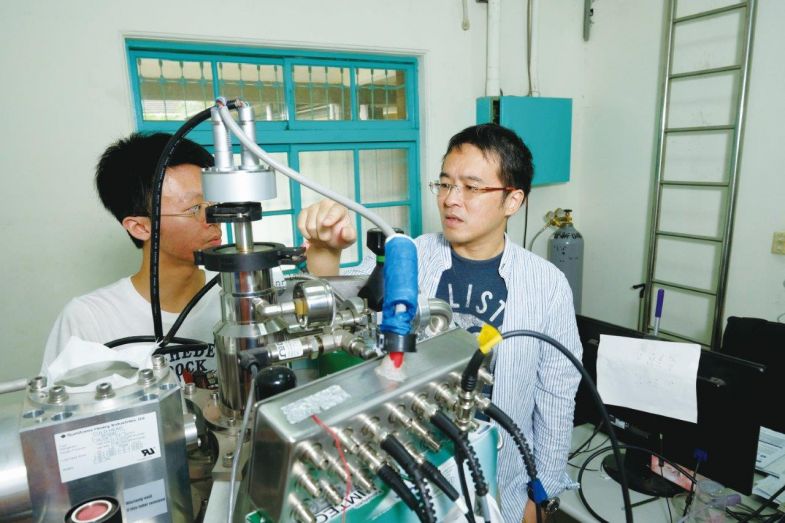Quantum Technology
Quantum technology, particularly quantum information science and the development of future electronics, is considered to be one of the major technologies that would totally change human life and lead us into the Fourth Industrial Revolution. It lies at the heart of many future technologies because most of the future technologies – for example, artificial intelligence, the Internet of Things, and their future development and potential – are all based on and limited by the power of computation and communication. It is believed that only quantum information processing can fully allow AI and other relevant technologies to achieve their potential or even revolutionise them.
We are now entering the era of the so-called second quantum revolution, where many intriguing quantum properties, such as superposition, entanglement and nonlocality, can be utilised to develop new technologies. Implementation of these quantum technologies combines a wide range of research, from quantum theory and algorithms to all aspects of quantum engineering in materials, devices, architectures, and so on. Over the past decade, NCKU has put a lot of resources and manpower towards quantum science and technology. This investment has led to the finest research outcomes in Taiwan and a new Center for Quantum Frontiers of Research and Technology (QFort).

QFort focuses on three strongly correlated research directions: theory for quantum devices and quantum computations; superconductor-semiconductor (and other emergent materials) hybrid quantum devices and qubits; and quantum material foundry.
Many outstanding enterprises, including Google, Microsoft, Intel and IBM, etc, have started to develop their own quantum computers or quantum software. The ultimate goal is to construct the universal quantum computer, providing overwhelming advantages against the classical one. The research team at QFort will use the quantum computer platforms, such as IBM-Q or Rigetti Computing, to test our quantum theory. From this, they will develop some efficient quantum algorithms to accomplish the desired tasks. They plan to examine the non-trivial properties in quantum correlations, including the spatial quantum steering and its temporal version, by constructing the efficient quantum circuits running on these platforms. In addition, to support the experimental research, they plan to study temporal quantum correlations in our hybrid quantum devices. This includes formulating precise measures of quantum correlations and investigating applications in quantum networks. They also plan to explore potential quantum sensing applications.
Another major research direction is to create and develop complementary metal oxide semiconductor-compatible (ie, promising for rapid scaling) hybrid quantum bits and devices by integrating superconductors and semiconductors, or other emergent materials, including topological insulators. For example, it can address a major challenge of scaling up the number of semiconducting spin qubits, since entanglement between them has been limited by very short-range exchange interactions. Hybridising superconducting microwave cavities and semiconductor spin qubits makes it possible to achieve long-distance entanglement of a large number of qubits. The research team has so far achieved many pioneering advancements in semiconductor quantum electronics. For example, it developed the world’s first all-electric all-semiconductor spin transistor by employing quantum point contacts as the spin injector and detector. It has also created a method to simultaneously manipulate and probe two spin types with controllable quantum phase correlation, which could lead to new kinds of interferometer or design principles for spintronics. Moreover, the zigzag Wigner crystal and some new types of Hall effect that were recently observed by the team are not merely of fundamental interest but also have potential technological applications; for example, serving as a quantum mediator to couple qubits that are physically apart.
Emergent quantum materials can create new paths to advance quantum technology, since intriguing and exotic quantum features contained in these materials can lead to new design principles and architectures in quantum logics; for example, the topological quantum computing based on the Majorana fermions. The QFort centre integrates scholars with different expertise – ranging from theoretical prediction to numerical simulation, epitaxial growth and material characterisation – to achieve cutting-edge breakthroughs in quantum materials. Their research interests centre on the topological materials, complex oxides and van der Waals materials. Some of their notable works include the theoretical prediction of the very first topological semimetal, an all-optical control of multiple ferroic orders beyond room temperature in a non-volatile way, and the first realisation of a gate-free monolayer pn diode.
Quantum science and technology is a highly interdisciplinary field, associated with physics, nanotechnology, material science, electrical engineering, computer science, and so on. QFort at NCKU has successfully integrated outstanding scientists and engineers from different disciplines and different countries to serve as a research hub and facilitate the development of quantum technology.
Source:
https://www.timeshighereducation.com/hub/national-cheng-kung-university/p/quantum-technology

